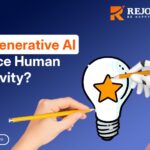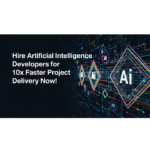Artificial Intelligence (AI) is no longer a futuristic concept—it is now an operational asset. Businesses across sectors are investing in AI to enhance productivity, optimize decision-making, and gain strategic advantages. According to a 2024 IDC report, global AI spending is projected to reach $500 billion by the end of 2025, marking a 26.9% compound annual growth rate (CAGR) from 2020. Another Gartner survey from 2023 revealed that 79% of corporate strategists considered AI essential for business success by 2025.
An experienced AI development company can help businesses integrate intelligent systems tailored to their needs. As AI capabilities evolve, companies need to understand what to expect in the coming years. This article outlines future trends, technical changes, and real-world business implications.
1. Wider Enterprise AI Adoption Across Industries
By 2025, AI will become a standard tool for enterprise operations rather than an experimental add-on. Industry-specific AI applications will expand beyond early adopters.
Use Cases by Industry:
- Healthcare: Diagnostic imaging, patient risk scoring, and drug discovery
- Retail: Dynamic pricing, customer behavior analysis, and supply chain optimization
- Manufacturing: Predictive maintenance and quality control via computer vision
- Finance: Fraud detection, automated trading, and credit scoring
- Agriculture: AI-guided irrigation, yield prediction, and pest control
Companies that partner with an AI development company can gain bespoke tools tailored to their industry needs.
2. Rise of Explainable AI (XAI)
As AI decisions become central to core business functions, transparency is critical. Black-box models are increasingly being replaced or augmented with explainable models.
Key Trends:
- Regulatory bodies are pushing for algorithmic transparency.
- Financial and healthcare sectors demand interpretability.
- Tools like SHAP, LIME, and Explainable Boosting Machines (EBM) are gaining traction.
Example: In 2024, a major US bank implemented explainable AI for loan approvals. It resulted in a 28% increase in customer trust and 12% fewer complaints.
3. AI + IoT for Real-Time Decision Making
The combination of AI and the Internet of Things (IoT) will allow devices to make real-time, data-driven decisions.
Applications:
- Smart factories with real-time anomaly detection
- Intelligent traffic systems adjusting to congestion
- Connected home appliances optimizing energy use
Table: AIoT Use Cases by Sector
|
Sector |
AIoT Application |
Business Outcome |
|
Manufacturing |
Real-time equipment monitoring |
Reduced downtime |
|
Logistics |
Fleet route optimization |
Faster deliveries |
|
Energy |
Smart grid management |
Lower operational costs |
|
Retail |
Smart shelves and inventory tracking |
Better stock control |
4. Edge AI Becoming Mainstream
Edge AI processes data on devices rather than in cloud servers. This reduces latency and increases data privacy—two factors that are crucial in sectors like healthcare and automotive.
Benefits:
- Faster response times
- Reduced bandwidth usage
- Improved data security
Example: Tesla uses edge AI to run autonomous driving software on in-car systems. This reduces reliance on cloud servers, ensuring real-time responses.
By 2025, Gartner predicts that 75% of enterprise-generated data will be processed outside traditional data centers, indicating a strong move toward edge AI.
5. Integration of AI with ERP and CRM Systems
ERP (Enterprise Resource Planning) and CRM (Customer Relationship Management) platforms are becoming AI-enabled.
Expected Advancements:
- Sales forecasting through historical pattern analysis
- Automated invoicing and error detection in financial records
- Real-time customer sentiment analysis from support tickets
Businesses working with an AI development company can custom-integrate AI features into their ERP or CRM platforms.
6. Autonomous Business Processes and AI Agents
AI is shifting from task-based automation to full-process autonomy. AI agents can now manage entire workflows without human intervention.
Real-World Examples:
- AI agents managing logistics from order to delivery
- Smart assistants scheduling meetings and sending follow-ups
- Autonomous financial reconciliation systems in banking
McKinsey estimates that automation of knowledge work could contribute up to $6.7 trillion to global GDP by 2030, with much of this being realized by 2025.
7. Natural Language Processing (NLP) Improvements
Language models are advancing rapidly. Businesses can now use AI to process large volumes of unstructured text data.
Applications:
- Legal document summarization
- Automated customer service via chatbots
- Sentiment analysis from social media data
Example: A telecom firm deployed an NLP model to handle customer complaints. It achieved a 45% reduction in resolution time and 95% accuracy in categorizing issues.
8. Ethical AI and Regulatory Compliance
Regulatory frameworks are evolving fast. Companies must ensure that AI systems comply with legal standards and ethical norms.
Regulatory Initiatives:
- EU AI Act (proposed in 2023): Classifies AI systems by risk level
- U.S. Algorithmic Accountability Act: Demands audits of automated decisions
- India’s Digital Personal Data Protection Bill: Focus on responsible data usage
By 2025, businesses will likely need internal AI ethics teams or consultants to maintain compliance.
9. Custom AI Models vs. Prebuilt APIs
Companies will face the choice between using off-the-shelf AI services or developing custom models.
Comparison Table:
|
Feature |
Prebuilt AI APIs |
Custom AI Models (via AI development company) |
|
Cost |
Low |
High (initially) |
|
Flexibility |
Limited |
Highly adaptable |
|
Performance Tuning |
Not possible |
Full control |
|
Data Privacy |
Shared |
Controlled in-house |
Custom solutions offer better control, especially in regulated sectors like healthcare and finance.
10. AI-Driven Cybersecurity
With increasing cyber threats, AI is being used to detect and respond to threats in real time.
Use Cases:
- Behavioral anomaly detection
- Malware identification via pattern recognition
- Phishing attempt prediction
Example: Darktrace, a cybersecurity firm, uses AI to autonomously identify and neutralize threats. By mid-2024, they reported a 92% success rate in early threat detection.
11. Workforce Transformation and AI Collaboration
AI is not replacing the workforce but reshaping roles. Human-AI collaboration will become a key productivity driver.
Roles that will evolve:
- Data analysts will become AI supervisors
- HR managers will rely on AI for talent analytics
- Legal researchers will work alongside NLP models
World Economic Forum (2023) predicted that AI will create 97 million new roles globally by 2025 while displacing fewer than it creates.
12. Predictions for AI in Business Beyond 2025
Looking further ahead, the landscape will continue evolving.
Future Outlook:
- Widespread adoption of multimodal AI (text, image, video integration)
- Decentralized AI models using blockchain for trust and traceability
- AI as a core component in organizational strategy, not just IT
Enterprises that embrace AI today with guidance from a capable AI development company will be well-positioned for this future.
Conclusion
The role of AI in business is expanding at an accelerated pace. From automation to deep analytics and real-time decision-making, AI’s footprint will touch all aspects of enterprise operations by 2025. Choosing the right approach—whether through edge computing, NLP, or ethical AI frameworks—requires a clear strategy and technical expertise.
Partnering with a trusted AI development company ensures that businesses can adapt, innovate, and lead in this evolving landscape. The future belongs to those who treat AI not as a tool but as an integral part of their operational DNA.
- The Future of AI in Business: Key Predictions for 2025 and Beyond | AI Development Company Insights
- Explore how AI will transform businesses by 2025 and beyond. Learn key trends, predictions, real-world examples, and insights from an expert AI development company.
- AI in business 2025, future of AI, AI development company, enterprise AI trends, explainable AI, AI predictions, AI and IoT, edge AI, NLP in business, AI business applications, AI-driven automation, AI compliance, AI cybersecurity, AI in ERP, AI in CRM, custom AI solutions, AI workforce transformation, AI business strategy
Related posts:
 Can Generative AI Truly Replace Human Creativity in the Future?
Can Generative AI Truly Replace Human Creativity in the Future?
 Blurring Boundaries: How AI is Reshaping the Future of Digital Art?
Blurring Boundaries: How AI is Reshaping the Future of Digital Art?
 Smart Contracts 2.0: The Next Evolution in Blockchain Technology
Smart Contracts 2.0: The Next Evolution in Blockchain Technology
 Exploring Coderway.net: A Modern Gateway to AI-Powered Image Creation
Exploring Coderway.net: A Modern Gateway to AI-Powered Image Creation
 Understanding AI Inference as a Service: How It Powers Smart Applications
Understanding AI Inference as a Service: How It Powers Smart Applications
 The Role of AI Model Libraries and Vector Databases in Modern AI Deployment
The Role of AI Model Libraries and Vector Databases in Modern AI Deployment
 Hire Artificial Intelligence Developers for 10x Faster Project Delivery Now!
Hire Artificial Intelligence Developers for 10x Faster Project Delivery Now!
 Revolutionizing App Development in Dubai with AI-Powered Custom Solutions
Revolutionizing App Development in Dubai with AI-Powered Custom Solutions







